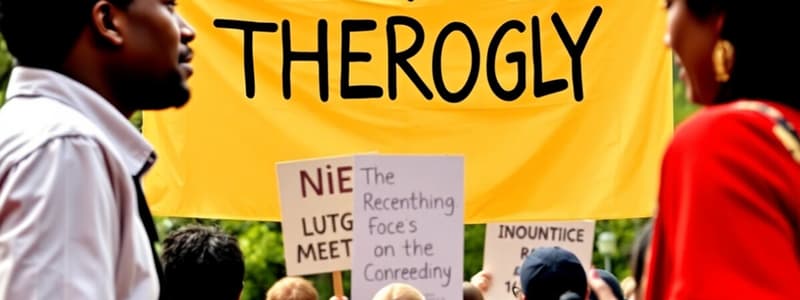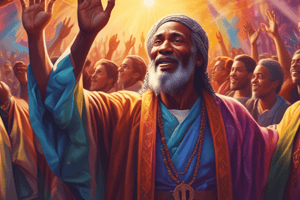Podcast
Questions and Answers
What is the main context of liberation theology?
What is the main context of liberation theology?
- The recognition of the suffering of a particular oppressed group (correct)
- The improvement of personal faith without collective action
- The acknowledgment of individual suffering only
- The analysis of religious texts without community involvement
What does the formation of community in liberation theology lead to?
What does the formation of community in liberation theology lead to?
- Reflections on the meaning of faith and actions for change (correct)
- A disconnect from the realities of oppression
- The abandonment of theological insights
- A stronger emphasis on individual spirituality
What is one significant result of recognizing oppression in liberation theology?
What is one significant result of recognizing oppression in liberation theology?
- A sense of complacency towards suffering
- A focus solely on ritual practices
- A sense of outrage and moral imperative to resist (correct)
- An impersonal interpretation of theological principles
How is liberation theology characterized in terms of its origin?
How is liberation theology characterized in terms of its origin?
What aspect of liberation theology distinguishes it from other forms of theology?
What aspect of liberation theology distinguishes it from other forms of theology?
What was highlighted in the bishops' document at the Medellin conference regarding injustice?
What was highlighted in the bishops' document at the Medellin conference regarding injustice?
What emotional response does the context of liberation theology invoke?
What emotional response does the context of liberation theology invoke?
What role does prayer and scriptural study play in liberation theology?
What role does prayer and scriptural study play in liberation theology?
What is a crucial component of liberation theology according to Juan Luis Segundo?
What is a crucial component of liberation theology according to Juan Luis Segundo?
How does liberation theology view the nature of sin?
How does liberation theology view the nature of sin?
What role does prayer play in the process of liberation theology?
What role does prayer play in the process of liberation theology?
What does liberation theology identify as necessary for understanding human existence?
What does liberation theology identify as necessary for understanding human existence?
What does liberation theology suggest about the influence of past decisions?
What does liberation theology suggest about the influence of past decisions?
In terms of liberation theology, which aspect is essential for community transformation?
In terms of liberation theology, which aspect is essential for community transformation?
What is intrinsic to the practice of liberation theology?
What is intrinsic to the practice of liberation theology?
How does liberation theology define the grace of God?
How does liberation theology define the grace of God?
What is the primary focus of liberation theology in contrast to classical theology?
What is the primary focus of liberation theology in contrast to classical theology?
Which disciplines does liberation theology utilize to analyze social situations?
Which disciplines does liberation theology utilize to analyze social situations?
What question does liberation theology often pose regarding privileged structures?
What question does liberation theology often pose regarding privileged structures?
What does liberation theology assert about superficial reforms?
What does liberation theology assert about superficial reforms?
In what way is liberation theology considered conflictual?
In what way is liberation theology considered conflictual?
What broader aim does liberation theology have besides intellectual understanding?
What broader aim does liberation theology have besides intellectual understanding?
What aspect of social analysis is emphasized in liberation theology?
What aspect of social analysis is emphasized in liberation theology?
How does liberation theology differ from narrative christology?
How does liberation theology differ from narrative christology?
What is the vision that drives liberation theology?
What is the vision that drives liberation theology?
What aspect does liberation theology critique through its vision?
What aspect does liberation theology critique through its vision?
What does the concept of realized eschatology imply in liberation theology?
What does the concept of realized eschatology imply in liberation theology?
According to liberation theology, how is God's saving will compromised?
According to liberation theology, how is God's saving will compromised?
What role do individual acts of lifting oppression play in liberation theology?
What role do individual acts of lifting oppression play in liberation theology?
What initial step is involved in the method of liberation theology?
What initial step is involved in the method of liberation theology?
What does the analysis of Christian tradition in liberation theology seek to uncover?
What does the analysis of Christian tradition in liberation theology seek to uncover?
What did the Latin American bishops express at Medellin regarding liberation?
What did the Latin American bishops express at Medellin regarding liberation?
What does the phrase 'Father, forgive them, for they know not what they do' illustrate about Jesus' attitude during his suffering?
What does the phrase 'Father, forgive them, for they know not what they do' illustrate about Jesus' attitude during his suffering?
How does the cross function in the perspective of liberation theology?
How does the cross function in the perspective of liberation theology?
What significance does the resurrection hold in liberation theology?
What significance does the resurrection hold in liberation theology?
What new title for Jesus emerged from the perspective of the poor and oppressed?
What new title for Jesus emerged from the perspective of the poor and oppressed?
What does the statement about God's loving power suggest regarding the ultimate triumph over evil?
What does the statement about God's loving power suggest regarding the ultimate triumph over evil?
In what way does Jesus' active ministry challenge the powerful?
In what way does Jesus' active ministry challenge the powerful?
How is the character of the risen Christ described in relation to the oppressed?
How is the character of the risen Christ described in relation to the oppressed?
What overall message does liberation theology convey regarding Jesus’ death?
What overall message does liberation theology convey regarding Jesus’ death?
Flashcards are hidden until you start studying
Study Notes
Liberation Theology
- Liberation theology is based on the recognition of the suffering of oppressed groups.
- It acknowledges that oppressions differ, such as poverty, political disenfranchisement, patriarchy, and apartheid.
- Communities formed around faith are the source of liberation theology.
- It emphasizes the importance of collective action in addressing injustice and suffering.
- Liberation theology emerged from the Medellin Conference in 1968, where bishops addressed the widespread poverty and injustice in Latin America.
Key Features of Liberation Theology
- Praxis: It emphasizes critical action alongside reflection.
- Social Nature of Human Existence: Recognizes the interconnectedness of individuals and societal structures.
- Sin and Grace: Liberation theology understands sin as both individual and structural, and believes grace can transform individuals and structures.
- Social Analysis: It utilizes social, political, economic, and anthropological studies to analyze the root causes of oppression.
- Goal of Transformation: Seeks not only to understand faith but also to change unjust situations.
- Realized Eschatology: Emphasizes the importance of God´s reign in the present, advocating for justice and peace as expressions of God's will.
Method of Liberation Theology
- Recognize and Name Oppression: Identifying oppressive situations and analyzing their root causes.
- Analyze Christian Tradition: Examining how Christian tradition may have contributed to or perpetuated oppression.
- Engage the Example of Jesus: Seeing Jesus as a model of active love and compassion for the marginalized, even in conflict with the powerful.
- Embrace the Cross: Viewing the cross as a symbol of God's solidarity with the suffering and a call to resistance against oppressive forces.
- Celebrate the Resurrection: Seeing the resurrection as a sign of God's liberative power breaking into the world, overcoming death and evil.
Key Theologian: Juan Luis Segundo
- He argued that liberation theology emerges from “praxis,” meaning it is a reflection on the challenges of those engaged in social action.
- He believed that reflection should happen at the end of a day of action, when people come together to reflect on their experiences and how they relate to God.
Jesus Christ: Liberator
- Liberation theology emphasizes the title of "Jesus Christ, Liberator."
- This title recognizes Jesus´s solidarity with the oppressed and positions him as a force fighting against oppressive powers.
Studying That Suits You
Use AI to generate personalized quizzes and flashcards to suit your learning preferences.




